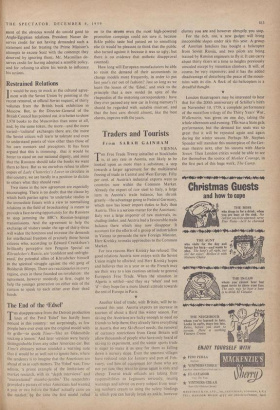.Restrained Relations
T T would be easy to mock at the cultural agree- 1 ment with the Soviet Union by pointing at the recent removal, at official Soviet request, of thirty volumes from the British book exhibition in Moscow. But, as the Director-General of the British Council has pointed out, it is better to show 3,970 books to the Muscovites than none at all, and, by the same token, the more—and the more varied—'cultural' exchanges there are, the more the Soviet citizen will learn to tolerate and even to understand points of view other than those of his own mentors and preceptors. It has been argued that this is trimming : that it would be better to stand on our national dignity, and insist that the Russians should take the books we want them to have. But as we ourselves refuse to allow copies of Lady Chatterley's Lover to circulate in this country, we are hardly in a position to dictate to others what they should read.
Two items in the new agreement are especially encouraging. There is no doubt that the clause by which both parties agree 'to undertake studies in the immediate future with a view to normalising relations in the field of broadcasting' is meant to provide a face-saving opportunity for the Russians to stop jamming the BBC's Russian-language transmissions. And the agreement to help the exchange of visitors under the age of thirty-three will widen the horizons and increase the demands for intellectual freedom of precisely those Soviet citizens who, according to Edward Crankshaw's brilliantly perceptive new Penguin Special on Khrushchev's Russia, are 'confident and unfright- ened,' the potential allies of Khrushchev himself in the spiritual struggle against the old gang of Bolshevik Blimps. There are reactionaries in every regime, even in those founded on revolution : the agreement, however modestly at first, ought to help the younger generation on either side of the curtain to speak to each other over their dead heads.














































 Previous page
Previous page